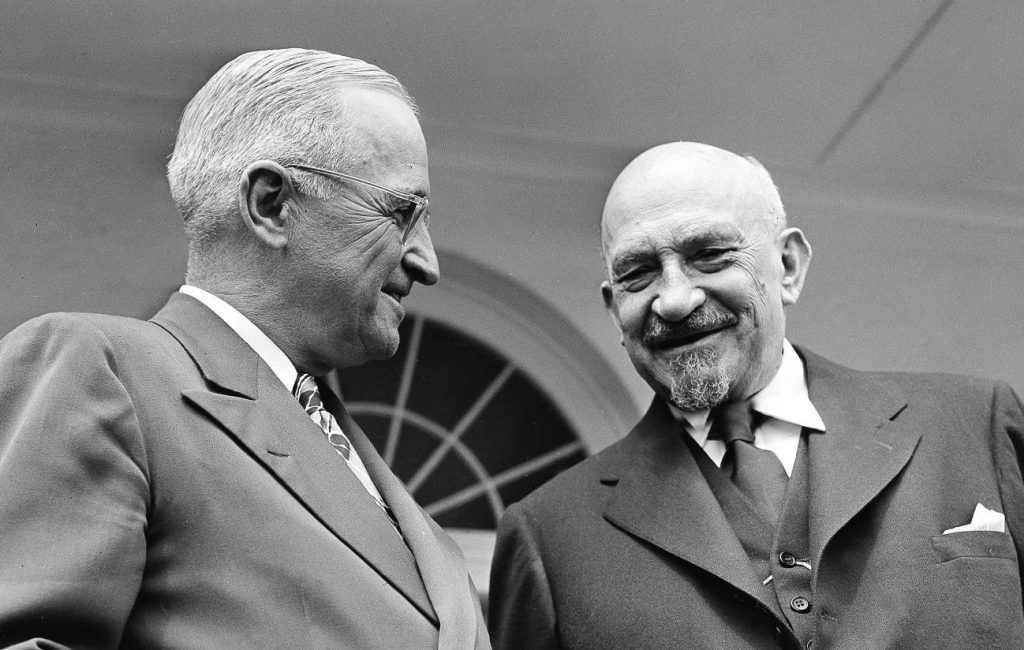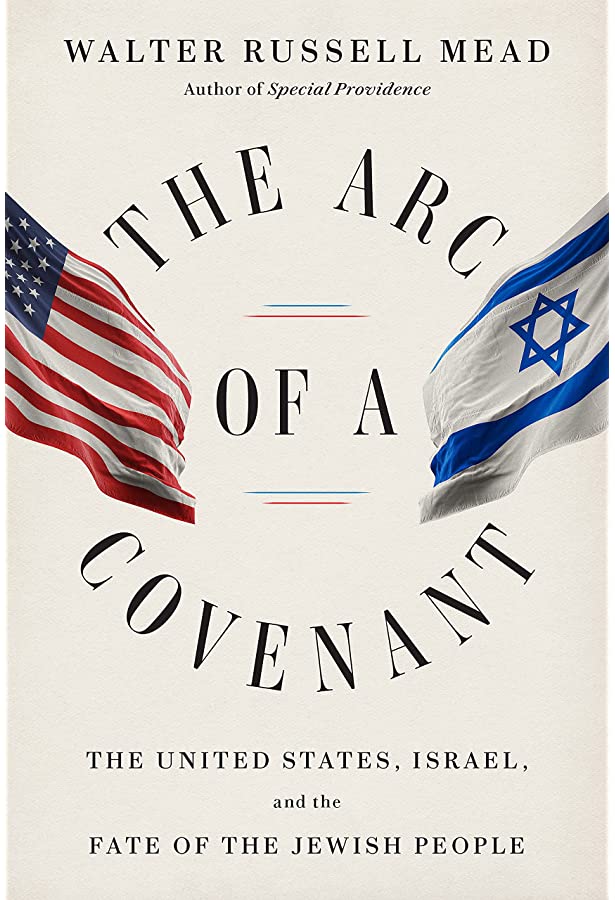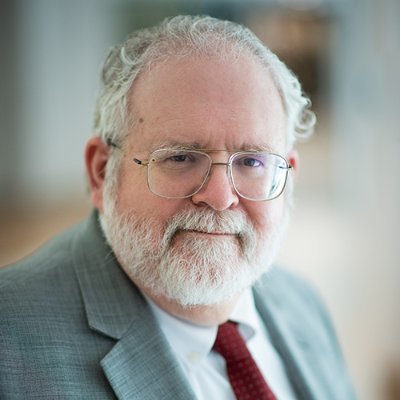Australia/Israel Review
Biblio File: Master class
Jan 30, 2023 | Paul Monk

 The Arc of a Covenant: The United States and Israel and the Fate of the Jewish People
The Arc of a Covenant: The United States and Israel and the Fate of the Jewish People
Walter Russell Mead
Alfred A. Knopf, New York, 2022, 654 pp., A$59.99.
Walter Russell Mead, now 70 years of age, is James Clarke Chace Professor of Foreign Affairs and Humanities at Bard College and Ravenel B. Curry III Distinguished Fellow at the Hudson Institute. It should be remarked, in passing, that both of those are remarkable institutions. Mead’s presence on their faculties is evidence of his stature.
The Hudson Institute, based in Washington, D.C., was founded in 1961 in Croton-on-Hudson, New York, by futurist, military strategist and systems theorist Herman Kahn and his colleagues at the RAND Corporation. Bard College was founded a century before that and is a residential liberal arts college. Its President, since 1975, has been the remarkable Leon Botstein, a Swiss-American conductor, educator and scholar.
Walter Russell Mead belongs in such company. He has devoted his career to the close study of the Anglo-American world order, rather as Aaron Friedberg has done, and the scholarship he has produced makes him an authoritative figure, always worth reading. This present book is no exception. Taking on a famously challenging problem, he has delivered a master class in both historiography and geopolitical judgement. We are all in his debt.
This is a large book, and not only because Mead takes us back well into the past to find the roots of American enthusiasm for Israel. It is also because he lingers over the great dramatic episodes in the history of American relations with the Jewish people, Zionism and the state of Israel in order to show that widespread assumptions or assertions about that history are, again and again, factually and inferentially mistaken.
The book has 21 chapters and is not divided by its author or publisher into other sub-divisions, but broadly speaking, it has three sub-divisions. Chapters 1 to 8 cover the prehistory of Israel and of American geopolitical strategy with regard to both the Jews and the Middle East. Chapters 9 to 13 cover the Truman and Eisenhower presidencies, the formation of the state of Israel and its early relations with Washington. Chapters 14 to 21 cover the decades from JFK to Trump and explain the logic of American engagement with Israel as it deepened.

Walter Russell Mead
There are several powerful themes in Mead’s writing which warrant close attention – if only those who dwell on these matters could be persuaded to sit down and absorb his book in detail. The first is that, though it was founded as a republic at the height of the Enlightenment, America has a deeply Biblical culture which has long inclined millions of Protestant Americans to view the idea of a state of Israel as the fulfilment of Bible prophecies and, therefore, as a vindication of Protestant faith itself.
The second is that America, as a land of immigrants – not least since the mass immigration from Europe of 1880 to 1924, which brought millions of Jews from Eastern Europe to the United States – has been experienced by its Jewish citizens as a kind of Promised Land in itself. One consequence of this is that American Jews have tended to “liberal” politics and to misgivings about the Zionist project as such, both in the early 20th century and more recently.
A third is that Israel did not grow strong because of American backing, but rather acquired American backing, chiefly after 1967, because it had grown strong. This was accentuated by the Yom Kippur War, in October 1973, which Henry Kissinger used to outflank the Soviet Union in the Middle East and strengthen the hand of the United States at the very point when Washington was withdrawing in disarray from Vietnam.
A fourth is that American policy regarding Israel was not shaped by either an American Jewish lobby or by Israeli lobbying, but by the geopolitical culture and domestic politics of the United States. Mead’s dissection of this issue is of great importance and fascination.
A fifth issue is that, until the Johnson-Reed Act of 1924 restricted immigration to the United States (not of Jews as such but more generally), the overwhelming preference of Jews escaping from persecution in Europe was to go to the United States (or elsewhere in the Americas), rather than to the severely depleted and impoverished land of Palestine. That land was then very far – under Ottoman suzerainty (until 1917) – from being a land of milk and honey.
As the rise of Nazism made the situation of Jews in Europe more and more dangerous, the opinion took hold in the United States that the British had had a good idea with the Balfour Declaration, voicing support for the creation of a “national home” for the Jews in Palestine. The Jews, like every ethnic people, it was thought, have a right not simply to asylum, but to a state of their own. What better place for such a state than Palestine?
The common opinion was that, since the Arabs were getting 97% of the former Ottoman Empire, what objection could there be to the Jews getting ‘a little sliver’ of it for themselves? The Arabs of Palestine were not seen as a distinct people, but as a sub-set of the mass of Arabs in the Middle East and North Africa.
And Palestine was not exactly a choice piece of real estate. For one thing, it had no oil. And it was access to oil that was the predominant priority of policy elites in both London and Washington DC in the 1920s and 1930s.
But this is where Mead’s nuanced analysis becomes especially interesting. He shows that those policy elites were very far from being under the sway of the Zionists, while wealthy Jews in both Britain and America tended, for the most part, to oppose Zionism, not promote it. Had the matter been left to them, the Balfour Declaration (and its American counterparts, the Blackstone Memorial of 1891 and its corollary, the Lodge Resolution of 1922) would never have resulted in support for the creation of the state of Israel.
In this regard, the central chapters of the book, on the presidency of Harry Truman, are crucial. It was, of course, Truman, in 1948, who gave Israel recognition and shepherded that recognition through the United Nations. But the politics behind that were, as Mead shows, highly complex. George Marshall, as Secretary of State, was horrified by the move and would have resigned had he not believed that that would be unprincipled. Mead is well worth reading for these critical chapters alone.
Not their least telling point is that, even granted UN recognition, Israel would very possibly have been snuffed out at its birth by the Arab armies, had it not been for Stalin making it possible for the infant state to buy large quantities of arms and ammunition in the nick of time from the Czech Skoda works, under Soviet control. These turned the tide of the war – rather as Soviet arms for the Chinese communists were turning the tide of the Chinese civil war at the same time.
But the beauties of Mead’s work are by no means confined to the pre-Truman and Truman years. His analysis of the close alignment between the United States and Israel since the Six Day War is brilliant. And he constantly demonstrates a capacity to understand multiple different, conflicting points of view.
If there is an overarching theme to his book, it is that the Protestant spirit of the United States has tended, again and again, to lead its statesmen and citizens into believing that their country has a providential role to play in history – an opinion not always endorsed by the professional diplomats and soldiers – and that this has, in the case of the Middle East, again and again led to serious miscalculations.
He is nowhere more scathing of this idealistic tendency than in his description of Barack Obama’s attempt to foster the “Arab Spring” – believing, as he charmingly expresses it, in the existence of ‘magical dancing democracy unicorns,’ only to collide with a brutal and intractable reality.
Yet his critique of the self-described “realists” is just as biting. As Mead argues cogently, if their pivotal assumption, that states are utility-maximising rational actors, were true, then US behaviour towards Israel and the Middle East would be close to inexplicable. That such an assumption should hold, he points out, is no more than an ideological pipedream. The world is messier than that. Reading Mead on this is rather like reading Thucydides.
Paul Monk is a former senior intelligence analyst, the author of 11 books and a Fellow of the Institute for Law and Strategy (London and New York). Walter Russell Mead will be visiting Australia in February 2023 as a guest of AIJAC.
Tags: Israel, United States






